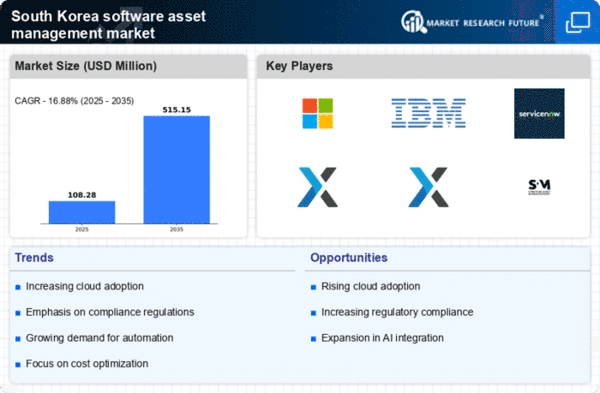Growing Regulatory Pressures
In South Korea, the software asset-management market is significantly influenced by increasing regulatory pressures. Government initiatives aimed at promoting compliance with software licensing agreements are becoming more stringent. Organizations face potential penalties for non-compliance, which can reach up to 100,000,000 KRW. This environment compels businesses to invest in robust software asset management solutions to ensure adherence to licensing requirements. The need for transparency and accountability in software usage is paramount, as regulatory bodies intensify their scrutiny. Consequently, the software asset-management market is poised for growth as companies seek to mitigate risks associated with non-compliance and enhance their operational integrity.
Emergence of Remote Work Trends
The software asset-management market in South Korea is adapting to remote work trends. As more organizations embrace flexible work arrangements, the need for effective software management becomes increasingly critical. Companies must ensure that their software assets are accessible and secure for remote employees, which can complicate traditional asset management practices. This shift has led to a growing emphasis on cloud-based solutions and remote monitoring tools, which are essential for managing software licenses and usage effectively. The market is likely to see a rise in demand for solutions that cater specifically to remote work environments, as organizations seek to maintain productivity and compliance in a distributed workforce.
Increased Focus on Data Security
Data security concerns are driving the software asset-management market in South Korea. With the rise of cyber threats, organizations are prioritizing the protection of their software assets. Effective asset management is crucial for identifying vulnerabilities and ensuring that software is up-to-date with the latest security patches. The software asset-management market is responding to this need by offering solutions that enhance visibility and control over software environments. Companies are increasingly investing in tools that provide insights into software usage and compliance, which can help mitigate risks associated with data breaches. As the landscape of cyber threats evolves, the demand for robust software asset management solutions is expected to grow, reflecting the critical importance of data security in today's digital age.
Rising Demand for Cost Efficiency
The software asset-management market in South Korea is experiencing a notable surge in demand for cost efficiency. Organizations are increasingly recognizing the financial benefits of optimizing software usage, which can lead to substantial savings. According to recent data, companies that implement effective software asset management strategies can reduce software costs by up to 30%. This trend is driven by the need to allocate resources more effectively and minimize waste. As businesses strive to enhance their operational efficiency, the software asset-management market becomes a critical component in achieving these goals. Furthermore, the competitive landscape in South Korea compels organizations to adopt innovative solutions that streamline software procurement and usage, thereby reinforcing the importance of effective asset management practices.
Shift Towards Digital Transformation
The ongoing digital transformation in South Korea is a pivotal driver for the software asset-management market. As organizations increasingly adopt digital technologies, the complexity of managing software assets escalates. This transformation necessitates a comprehensive approach to software management, ensuring that businesses can effectively track and optimize their software investments. Recent studies indicate that companies embracing digital transformation are likely to see a 20% increase in productivity. The software asset-management market plays a crucial role in facilitating this transition by providing tools and frameworks that support efficient software utilization. As South Korean enterprises continue to evolve digitally, the demand for sophisticated asset management solutions is expected to rise.

















Leave a Comment